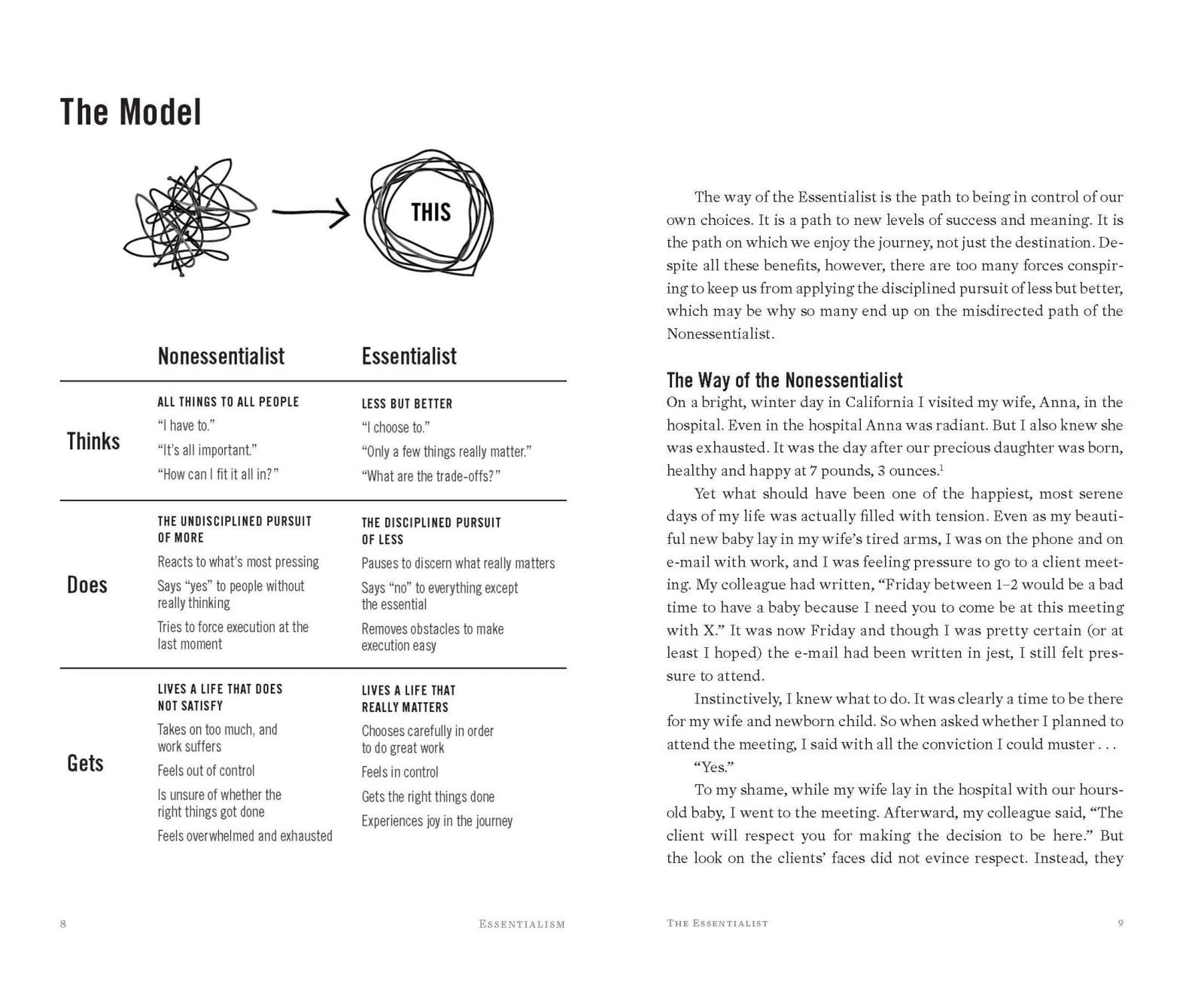This book suggests that we do fewer things, in order to make better contributions in a refined area of focus.
I came across “Essentialism: The Disciplined Pursuit of Less” by Greg McKeown as part of a mastermind group over lockdown, and at the time had way too many projects on my plate. This included work for a wide range of clients, my freelance web design business with several brands and websites to maintain, this freelance blog and a mental health app that I had neither the knowledge or budget to product which was sucking my time and energy with no real progress.
As a freelancer we’ve got the freedom to choose what we do and when we do it. In my case this often leads to taking on too many client projects as well as starting my own projects that I’m interested in (often for a short time). This is great for keeping things fresh, but also leads to me not making significant progress with any of the projects. Add to that existing and new clients asking for things that I might not really specialise in but fancy having a go at (3D modelling! Copywriting! New programming languages or software!) and it became a right mess.
Enter Essentialism
Have you ever found yourself stretched too thin?
Do you sometimes feel overworked and underutilized?
Do you feel motion sickness instead of momentum?
Does your day sometimes get hijacked by someone else’s agenda?
Have you ever said “yes” simply to please and then resented it?If you answered yes to any of these, the way out is the Way of the Essentialist.
Here are some of the key principles of Essentialism as outlined in the book:
- Focus on what really matters: Essentialists prioritise the most important tasks and activities that align with their values, goals, and purpose, and eliminate non-essential distractions.
- Say “no” more often: Essentialists are not afraid to say “no” to non-essential tasks, requests, and opportunities that don’t align with their priorities and goals.
- Simplify: Essentialists strive to simplify their lives by decluttering their physical and mental space, and eliminating unnecessary complexity.
- Create space for reflection and renewal: Essentialists create space for regular reflection and renewal to recharge their energy, clarify their priorities, and stay focused on what really matters.
- Pursue less but better: Essentialists focus on doing fewer things, but doing them better, with greater quality, and more impact.
- Prioritize self-care: Essentialists prioritize self-care, including sleep, exercise, healthy eating, and other activities that promote their physical, mental, and emotional well-being.
- Embrace constraints: Essentialists embrace constraints as a source of creativity and innovation, and focus on finding creative solutions within the limits of their resources and time.
With these ideas, Essentialism encourages us to be more intentional (fun fact: I renamed my business to Intention, partly because of this!), focused, and disciplined in our pursuits, and to prioritise what truly matters in our lives.
Example page from Essentialism, from https://gregmckeown.com/books/essentialism/
Relation to other works
Some of these principles reminded my of Covey’s “Seven Habits” and Allen’s “Getting Things Done”. To be really effective as a freelancer, we need to decide what’s important and what we can profitably provide to our clients. Declining everything else to avoid working crazy hours for little reward and burning ourselves out.
Learning to say no is a vital part of setting and maintaining boundaries – an essential skill for our work and private lives. This is a key element to the counselling training I undertook too, with the goal of keeping that draining work in balance with the rest of our activities.
So how did Essentialism affect me?
This book and the conversations around it we had in the mastermind group led to some big changes for me and my projects;
- Quit work on the mental health app: The first action I took after digesting Essentialism was to stop work on the mental health app and delete the website and social media accounts. That was a huge relief, as deep down I knew this project wasn’t ever going to be launched.
- Refocus and rebrand the web design business: I’d been wanting to work with more eco and ethical companies for a while and the extra time of lockdown plus Essentialism got me over the line with this. I outsourced the branding, renamed and wound down working for clients that I wasn’t 100% committed to. This was a huge leap of faith and meant increasing my marketing to attract the right clients. If I’m honest, this has hurt my bottom line but I’m much more engaged with the smaller number of clients I now work with.
- Social media: I deleted some social media accounts and stopped posting to most of the others. I got no new work from them and they were a time suck I was starting to resent. I get angry when scrolling the bullshit on social media too, so spending less time on there was a double win!
- Stopped saying ‘yes’ straight away: I started considering the impact of new projects when asked to do them – if they are not aligned with my new brand and will take time away from things that matter, then I don’t say yes to them.
Summary
Essentialism encourages us to prioritise tasks and activities that align with our values, goals, and purpose, and eliminate distractions. This has had a lasting effect on me – focusing me on what I think matters rather than doing things for other people’s sake. It’s not easy making these changes as we have to dig deep to uncover what matter to us as well as learning to say ‘no’ to people and things. It’s worth the effort however as it reduces stress, engages us more fully and helps us live the life we want to live.


